As we’ve been here in Flensburg for several
days now, I thought I ought to spend a while on this town’s fascinating
history. Obviously, its’ position at the head of the fjord suggests that there
may have been settlements here for some time and it is reckoned that Danish
settlers were here at least as early as the 12th Century, attracted
in part by the vast shoals of herring and it was herring, in the form of
kippers that formed the mainstay of Flensburg’s first industry. By the 16th
century, Flensburg had developed significant trading links with and was
importing goods from, areas as far away as the Mediterranean, Caribbean and
Greenland – the latter two being principally rum, sugar and whale oil. Indeed,
by this time Flensburg was second only to Copenhagen in its’ importance to the
Danish crown. Incidentally, the sugar and rum came from the then Danish
possessions in the Caribbean, the islands which now constitute the US Virgin
islands. By the 18th century Flensburg was well known for its’ rum
manufacture, now rather than importing crude rum and refining it as occurred
originally, sugar was brought over and turned into rum here.
Today there
remains only one distiller, A. H. Johanssen.
Flensburg remained a Danish town until
1864, when it was ceded to Prussia after the second Schleswig war. This caused
a problem for the rum trade, as the Virgin islands were now closed to them so
instead, they imported sugar from the British-owned island of Jamaica.
Interestingly, the Flensburg owned vessels never had any dealings with the
slave trade as such, this dubious honour being the sole province of
Copenhagen-based vessels but obviously, indirectly they were massively involved
as sugar was the product of the slave trade.
The population of Flensburg constituted a
majority of German speakers but there was a significant minority of native
Danish speakers here. However, they were outvoted in a vote brought about by
the League of Nations to decide once and for all, the position of the
Danish/German border in 1920 and Flensburg became German, whist certain other
areas nearby were ceded to Denmark. Flensburg remained relatively unscathed
during WW2 suffering minor aerial bomb damage but more significant destruction
from the accidental blowing up of a munitions store.
One final claim to fame
for the town during this period was that for a few weeks, after the suicide of
Hitler, Karl Dönitz, now president of Nazi Germany, brought what remained of
the government to Flensburg and thus it became the seat of power, until that is,
they were all arrested by the British.
One final story from the war that serves
telling, involves the smelly old boat Alexandra that I mentioned on Thursday.
This venerable old lady, dating from 1908, played a significant humanitarian
role during the closing stages of the conflict, in that she transported many
German people from the Communist east to freedom in the west, apparently
running so low on fuel that they had to break up some of her wooden furniture
and fittings to maintain the boilers. Today she is run by a group of volunteers
and offers trips round the bay, presumably it was that which we witnessed on
Thursday.
Enough of history, what did we do today?
Not a lot, given the indifference of the weather. We did the laundry in the
morning and then went for a walk around the harbour to look at the old vessels
which constitute Flensburg’s contribution to the maritime history of the
Baltic.
It is quite an important venue, the first sailing regatta was held here
in September 1855 and it formed the basis of yachting in the Baltic. In 2005 it
was decided to commemorate this early endeavor by inviting classic yachts form
all over to participate in a re-run and this, together with the Robbe &
Berkin Classics, a week- long event for Classic yachts, ensures Flensburg’s
place on the map with regard to sailing. Robbe & Berkin, incidentally, are
boat builders and refurbishment specialists based here in Flensburg, here is
their URL
There were numerous old yachts and power
boats to be admired on the quayside, ranging from tiny 5m boats up to large
commercial cargo vessels. I always marvel at the passion of people who are
prepared to devote their time and not inconsiderable amount of money to
renovating and maintaining these old boats – thank goodness for them!
We then visited the Maritime Museum which
again was a disappointment in that the captions were all in German or Danish,
so we didn’t learn a great deal.
There was however a 20 minute film running which
occasionally was in English and as it happened, the English version had just
started when we got there, so we were given some insight into the history of
this town.
From the museum we headed back to the boat
via the main street called Norderstrasse and here we witnessed the intriguing habit of throwing pairs of
shoes, tied together via their laces to suspend from overhead wires – no idea
why! We then did a bit of shopping in the supermarket Rewe and headed back to
the boat for lunch.
That afternoon, we were entertained to
coffee and snacks on board Tangara 111, a Beneateau 361 dating from 2000 and
owned by Andrea and Graham Facey. I mention the age of the boat as she had
beautiful dark mahogany woodwork down below, it was very nice indeed but
Beneteau stopped this practice around then, replacing the wood with material
with a lighter finish. The Faceys are an interesting couple, originally from
Australia but who have spent all their working lives, pretty much, in mainland
Europe and the UK.
They speak German and French fluently, have an apartment on
the French Riviera and now in retirement wanted to get away from the crowds and
expense of the Mediterranean and intend spending their summers here in the
Baltic. As such, we were able to provide them with some advice and guidance and
we wish them well with their plans – hopefully they will derive as much
pleasure as we have from our time here in the Baltic.
That evening again, we stayed on board and
read and watched a little TV. The weather forecast for tomorrow is even direr
(is that a word?) so it looks like we’ll be here again (I’m cheating, we are,
as it’s then that I’m typing this!).
PS Julie has looked up about the shoe
business – it’s to celebrate a rite of passage such as passing exams or
entering the military or – losing one’s virginity!! Not many virgin soldiers
around here, I reckon!!

 Flensburg, Schleswig-Holstein, Germany
Flensburg, Schleswig-Holstein, Germany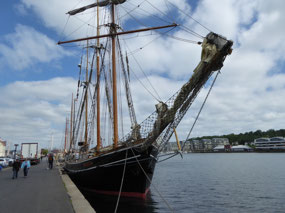
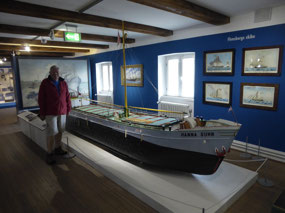
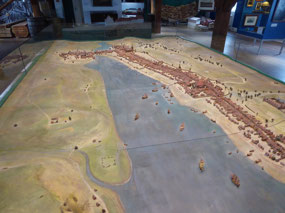
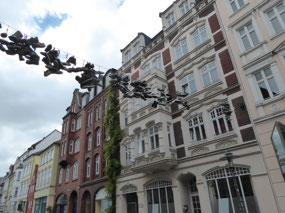
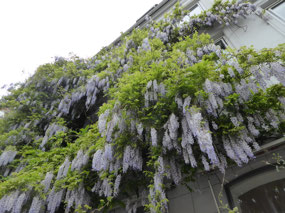
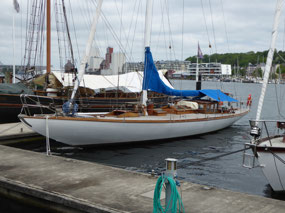


2025-05-23